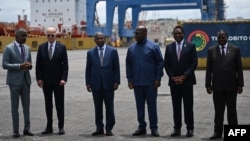The United States is looking to partner with Africa in the years ahead. Nowhere are the prospects more exciting than in Angola, declared President Joe Biden on his recent visit to the country.
“Together, we’re engaged in a major joint project to close the infrastructure gap for the benefit of Angolans, Africans across the continent, Americans, and the world,” said President Biden:
“It’s called the Lobito Corridor. We’re building railroad lines from Angola to the Port of Lobito, in Zambia and the [Democratic Republic of the Congo], and, ultimately, all the way to the Atlantic — from the Atlantic Ocean to the Indian Ocean. It’ll be the first trans-continental railroad in Africa and the biggest American rail investment outside of America.”
The Lobito Corridor project will not only generate significant employment, it will also allow individual countries to maximize their domestic resources for the benefit of their people by selling and transporting critical minerals in a fraction of the time and at lower cost.
The Lobito Corridor project represents the right way to partner with a country and its people, said President Biden:
“As part of this project, we will install enough clean energy power to power hundreds of thousands of homes, expand high-speed Internet across — for millions of Angolans, which is as consequential today as electricity was two generations ago. And we’re investing in agriculture and food security, fulfilling the needs of countries without agricultural capacity and expanding opportunities for countries growing the crops; connecting farmers along the Lobito Corridor to new markets.”
“The United States understands how we invest in Africa is as important as how much we invest,” noted President Biden. “In too many places, 10 years after the so-called investment was made, workers are still coming home on a dirt road and without electricity, a village without a school, a city without a hospital, or a country under crushing debt.”
“We seek a better way: transparent, high-standard, open-access investments that protect workers and the rule of law and the environment. It can be done and will be done.”
The story of Angola and the United States holds a lesson for the world: two nations on opposite sides of the Cold War; and now, two nations standing shoulder to shoulder, working together every day for the mutual benefit of our people.






